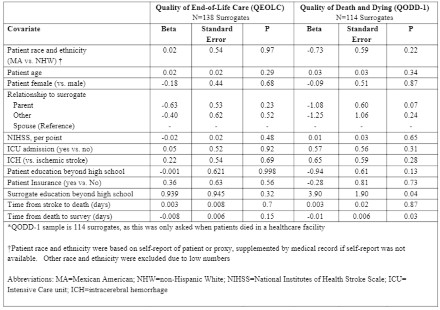Final ID: WP210
Quality of Death and End-of-Life Care of Mexican American versus Non-Hispanic White Stroke Patients: The OASIS Study
Hypothesis: Surrogate decision makers of deceased Mexican American (MA) stroke patients will report lower quality of death and end-of-life care than surrogates of non-Hispanic White (NHW) patients.
Methods: Stroke patients and their family surrogate decision makers were recruited from the BASIC and OASIS studies in Nueces County, Texas (4/2016-9/2020). Surrogates completed the validated Quality of End-of-Life Care (QOEOLC) and single-item Quality of Death and Dying (QODD-1) instruments (both range 0-10 with higher=better quality). Linear regression models were used to assess the relationship between patient ethnicity and outcome, using generalized estimating equations and multiple imputation for missing covariate data. Model covariates were pre-specified based on their known or theoretical association with ethnicity and/or outcome.
Results: Data from 138 surrogates for 113 MA or NHW stroke patients were included. Patient characteristics were median age: 78 years; female: 53%; education beyond high school: 40%; median NIHSS: 18; admitted to ICU: 58%; died in the hospital: 51%; and race-ethnicity (MA 59%, NHW 41%). Surrogate characteristics were median age: 60 years; female: 75%; child of patient: 65%; and education beyond high school 69%. There was no difference in the QEOLC in MA vs. NHW stroke patients on unadjusted [Beta=-0.13 SE=0.46, p=0.78] or fully adjusted analysis [Beta=0.02 SE=0.54, p=0.97]. For the QODD-1, surrogates of MA patients reported a lower of quality of death on unadjusted analysis [Beta=-0.99 SE=0.48, p=0.04], though this was no longer significant after adjustment for patient age, sex and surrogate relationship, or in the final fully adjusted model (see Table). While overall QODD-1 scores were high (Median 10 IQR 8,10), surrogates with education beyond high school reported QODD-1 scores nearly 4 points higher than those with high school education or less, after adjustment.
Conclusions: In contrast to other work, we did not find differences in the quality of death or end-of-life care by ethnicity among Mexican American and non-Hispanic White stroke patients after adjusting for demographics and other factors. Further exploration of the differences in QODD-1 scores may help understand how to best support all families facing death after stroke.
More abstracts on this topic:
Mondal Avilash, Kutalek Steven, Basnet Arjun, Chilingarashvili Giorgi, Li Aobo, Tripathi Devendra, Ashish Kumar, Haider Mobeen, Fagan James, Gupta Ashwani
Clopidogrel plus aspirin vs. aspirin alone in patients with minor to moderate strokes within ≤ 72 hours onset. A meta-analysis of randomized controlled trials.Mahmoud Abdelrahman, Elfil Mohamed, Abdelsayed Kerollos, Amin Ahmed Mazen, Ramadan Mohamed, Ahmed Ali Ashraf Salah, S.a Osman Ahmed, Banour Sandi, Abdelazeem Basel
Readers' Comments
We encourage you to enter the discussion by posting your comments and questions below.
Presenters will be notified of your post so that they can respond as appropriate.
This discussion platform is provided to foster engagement, and simulate conversation and knowledge sharing.
You have to be authorized to post a comment. Please, Login or Signup.

